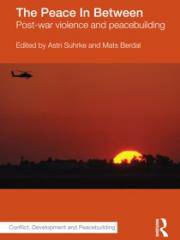How do 'warlords' - defined in the Afghan context both by their military skills and capacity to strike a balance between local and external sources of support - respond when the war they are fighting ends? Why do some choose compliance with the new political order while others remain engaged in various forms of opposition? The political biographies of three longstanding warlords of the largely Pashtun southeast of Afghanistan - Mullah Rocketi, Qari baba and Jalahuddin Haqqani - enable us to explore the dynamics of quite different responses. The 2001 US-led intervention and the transitional challenges that followed led the three men in different directions. Why was this so? Why did one man lay down his arms to become a politician, another place his capacity for commanding violence at the service of the new Karzai government, while the third continued to challenge the new rulers with armed force? The analysis of these different trajectories provides an insight into the nature of violent warlordism during the formal transition from war to peace and into the post-conflict period.
Harpviken, Kristian Berg (2012) Warlordism: Three Biographies From Southeastern Afghanistan, in The Peace in Between: Post-war Violence and Peacebuilding. London: Routledge (173–191).







